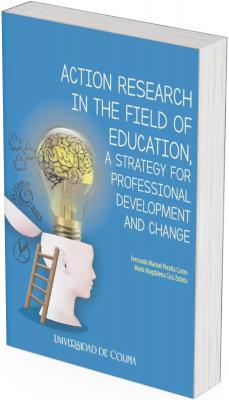Action Research in the Field of Education: A Strategy for Professional Development and Change
Palabras clave:
Investigación Acción, EducaciónSinopsis
Esta investigación documental tiene como objetivo ilustrar a los lectores con una revisión detallada de la literatura sobre la Investigación Acción (IA). Un método que se ha utilizado para investigar y resolver situaciones problemáticas en diferentes escenarios y diferentes campos del conocimiento. El documento examina la literatura sobre IA y su conexión con el campo de la educación. Explica cómo se produce un desarrollo significativo de IA en situaciones educativas y cómo ayuda a los maestros a verse a sí mismos como investigadores. En la publicación también se muestran varios modelos de IA. El documento resalta el uso de IA en los campos del desarrollo profesional, el conocimiento fundamentado en la práctica y la mejora de la labor docente basándose en hallazgos de investigaciones actuales.
Descargas
Referencias
Adelman, C. (1993). Kurt Lewin and the Origins of Action Research. Educational Action Research, 1(1), 7-24. https://doi.org/10.1080/0965079930010102
Amin, M.; Rashid, R. and Teh, K. (2019). Investigating Issues and Challenges in Employing Action Research for Teacher Training in Malaysian Contexts. International Journal of Education and Practice, 7 (1), 30-40. https://doi.org/10.18488/journal.61.2019.71.30.40
Ahmad, A. and Sajjad, P. (2011). Role of Local Constraints in the Failure of Western Approaches to ELT. Procedia Social and Behavioral Sciences, 15, 1766-1770. https://doi.org/10.1016/j.sbspro.2011.03.366
Anderson, G.L. (2002). Reflecting on Research for Doctoral Students in Education. Educational Researcher, 31(7), 22-25. https://doi.org/10.3102/0013189X031007022
Atay, D. (2008). Teacher Research for Professional Development. ELT Journal, 62(2), 139-147. https://doi.org/10.1093/elt/ccl053
Bachmann, L. (2001). Review of the Agricultural Knowledge System in Fiji: Opportunities and Limitations of Participatory Methods and Platforms to Promote Innovation Development. Berlin, Germany: Humboldt University to Berlin. http://edoc.hu-berlin.de/dissertationen/bachmann-lorenz-b-r-2000-12-21/HTML/bachmann-ch3.html
Banegas, D.L. (2011). Teachers as 'Reform-doers': Developing a Participatory Curriculum to Teach English as a Foreign Language. Educational Action Research, 19(4), 417-432. https://doi.org/10.1080/09650792.2011.625654
Bhushan, R. (2013). Continuous Professional Development Through Interaction and Collaborative Action Research. Procedia Social and Behavioral Sciences, 70, 131-136. https://doi.org/10.1016/j.sbspro.2013.01.048
Borko, H.; Liston, D. and Whitcomb, J.A. (2007). Genres of Empirical Research in Teacher Education. Journal of Teacher Education, 58(1), 3-11. https://doi.org/10.1177/0022487106296220
Burchell, H. (2000). Facilitating AR for Curriculum Development in Higher Education. Innovations in Education and Training International, 37(3), 263-269. https://doi.org/10.1080/13558000050138506
Burns, A. (2005). Action Research: An Evolving Paradigm? Language Teaching, 38(2), 57-74. https://doi.org/10.1017/S0261444805002661
Burns, A. (2009). Action Research in Second Language teacher education. In: A. Burns and J.C. Richards (Eds.), The Cambridge Guide to Second Language Teacher Education (pp. 289-297). CUP.mhttps://doi.org/10.1017/9781139042710.038
Calhoun, E.F. (1994). How to Use Action Research in the Self-Renewing School. Alexandria, VA: Association for Supervision and Curriculum Development.
Cambareri, L.A. (2021). Action Research as Professional Development: Creating Effective Professional Development in Every Classroom. Theses and Dissertations-Educational Leadership Studies. 36. https://doi.org/10.4324/9781003230274-4
Carr, W. and Kemmis, S. (1986). Becoming Critical: Education, Knowledge and Action Research. Deakin University Press. https://doi.org/10.1007/978-94-6091-639-7_7
Carver, C.L. and Klein, C.S. (2013). Action Research: A Tool for Promoting Faculty Development and Continuous Improvement in Leadership Preparation. International Journal of Educational Leadership Preparation, 8(2), 162-177. https://files.eric.ed.gov/fulltext/EJ1016259.pdf
Cunningham, B. (1999). How Do I Come to Know my Spirituality as I Create My Own Living Educational Theory? UK: University of Bath. https://purehost.bath.ac.uk/ws/portalfiles/portal/188155573/Ben_Cunningham_thesis.pdf
Dewey, J. (1929). The sources of a Science of Education. Horace Liverlight.
Elliott, J. (2007). Reflecting Where the Action is: The Selected Works of John Elliott. Routledge.
Elliott, J. (1991). Action Research for Educational Change. Open University Press.
Fareh, S. and Saeed, A.T. (2011). The Teacher as Researcher in the Context of Language Teaching. Procedia Social and Behavioral Sciences, 15, 153-159. https://doi.org/10.1016/j.sbspro.2011.03.066
Feldman, A.; Altrichter, H. and Somekh, B. (2008). Teachers Investigate their Work. An Introduction to Action Research Across the Professions. 2nd ed. Routledge.
Feldman, A. (2007). Teachers, Responsibility and Action Research. Educational Action Research, 15(2), 239-252. https://doi.org/10.1080/09650790701314809
Foster, P. (1999). Never Mind the Quality, Feel the Impact: A Methodological Assessment of Teacher Research Sponsored by the Teacher Training Agency. British Journal of Educational Studies, 47(4), 380-398. https://doi.org/10.1111/1467-8527.00126
Furlong, J. and Salisbury, J. (2005). Best Practice Research Scholarships: An Evaluation. Research Papers in Education, 20(1), 45-83. https://doi.org/10.1080/0267152052000341336
Geyer, N. (2008). Reflective Practices in Foreign Language Teacher Education: A View Through Micro and Macro Windows. Foreign Language Annals, 41(4), 627-638. https://doi.org/10.1111/j.1944-9720.2008.tb03321.x
Ginsberg, R. (2022). Preservice Teacher Action Research: Making Meaning and Generating Knowledge Through Inquiry. Theses, Dissertations and Culminating Projects. 846. https://digitalcommons.montclair.edu/etd/846
Glassman, M.; Erdem, G. and Bartholomew, M. (2012). Action Research and its History as an Adult Education Movement for Social Change. Adult Education Quarterly, 63(3), 272-288. https://doi.org/10.1177/0741713612471418
Hammersley, M. (2004). Action Research: A Contradiction in Terms. Oxford Review of Education, 30(2), 165-181. https://doi.org/10.1080/0305498042000215502
Hendricks, C.C. (2013). Improving Schools Through Action Research: A Reflective Practice Approach. 3rd ed. Pearson.
Hirst, P. (1983). Educational Theory and its Foundation Disciplines. RKP.
Holloway, K. and Long, R. (1998). Teacher Development and School Improvement: The Use of 'Shared Practice Groups' to Improve Teaching in Primary Schools. Journal of In-Service Education, 24(3), 535-545. https://doi.org/10.1080/13674589800200056
Jefferson, R.N. (2014). Action Research. Theory and Application. New Review of Academic Librarianship, 20(2), 91-116. https://doi.org/10.1080/13614533.2014.921536
Johnson, A.P. (2008). A Short Guide to Action Research. 3rd ed. Sage Publications.
Kemmis, S. and McTaggart, R. (1988). The Action Research Planner. Deakin University Press.
Kirkgöz, Y. (2008). A Case Study of Teachers' Implementation of Curriculum Innovation in English Language Teaching in Turkish Primary Education. Teaching and Teacher Education, 24(7), 1859-1975. https://doi.org/10.1016/j.tate.2008.02.007
Lewin, K. (1945). Action Research and Minority Problems. In: G.W. Lewin (Ed.), Resolving Social Conflicts. New York: Harper and Row. http://krishikosh.egranth.ac.in/bitstream/1/17809/1/IVRI%20B%20529.pdf
Manfra, M.M. (2019). Action Research and Systematic, Intentional Change in Teaching Practice. Review of Research in Education, 43 (1), 163-196. https://doi.org/10.3102/0091732X18821132
Maksimovic, J. (2010). Historical Development of AR in Social Sciences. Facta Universities, 9(1), 119-124. http://facta.junis.ni.ac.rs/pas/pas2010/pas2010-10.pdf
Maxwell, T.W. (2003). Action Research for Bhutan? Rabsel III, 1-20. https://www.researchgate.net/publication/279948945_Action_Research_for_Bhutan
McKernan, J. (1991). Curriculum Action Research a Handbook of Methods and Resources for the Reflective Practitioner. 2nd ed. Routledge.
McNiff, J. (2013). Action Research Principles and Practice. 3rd ed. Routledge. https://doi.org/10.4324/9780203112755
McNiff, J. and Whitehead, J. (2010). You and Your Action Research. Routledge. https://doi.org/10.4324/9780203871553
McTaggart, R. (1994). Participatory AR: Issues in Theory and Practice. Educational Action Research, 2(3), 313-337. https://doi.org/10.1080/0965079940020302
Mertler, C.A. (2009). Action Research: Teachers as Researchers in the Classroom. Sage Publications.
Mertler, C.A. (2014). Action Research Improving Schools and Empowering Educators. Sage Publications.
Meyer, J. (2000). Qualitative Research in Health Care. Using Qualitative Methods in Health Related Action Research. BMJ, 320, pp-pp 178-181. https://doi.org/10.1136/bmj.320.7228.178
Nason, P.N. and Whitty, P. (2007). Bringing Action Research to the Curriculum Development. Educational Action Research, 15(2), 271-281. https://doi.org/10.1080/09650790701314916
Noffke, S.E. (2009). Revising the Professional, Personal and Political Dimensions of Action Research. In: S.E. Noffke and B. Somekh (Eds.), The SAGE Book of Educational Action Research (pp. 5-18). Sage Publications. https://doi.org/10.4135/9780857021021
Osmanović-Zajić, J.; Mamutović, A. and Maksimović, J. (2021). The Role of Action Research in Teachers' Professional Development. International Journal of Cognitive Research in Science, Engineering and Education (IJCRSEE), 9(3), 301-317. https://doi.org/10.23947/2334-8496-2021-9-3-301-317
Parson, R.D. and Brown, K.S. (2002). Educator as Reflective Practitioner and Action Research. Wadsworth.
Piggot-Irvine, E. (2002). Rhetoric and Practice in Action Research. Paper Presented at the Annual Conference of the British Educational Research Association, University of Exeter. Exeter, UK. http://www.leeds.ac.uk/educol/documents/00002471.htm
Rebolledo, P. and Bullock, D. (Eds). (2020a). Champion Teachers Mexico II: Stories of Exploratory Action Research. London: British Council. https://www.teachingenglish.org.uk/sites/teacheng/files/championteachers2020_escuelas_normales-oct25.2021-interactivo_lr.pdf
Rebolledo, P. and Bullock, D. (Eds). (2020b). Champion Teachers Mexico: Stories of Exploratory Action Research in Escuelas Normales. London: British Council.
Riel, M. (2007). Understanding Action Research. The Center for Collaborative Action Research, Pepperdine University. http://cadres.pepperdine.edu/ccar/define.html.
Salm, T. (2014). Action Research to Improve Collaboration Among Student Support Services Teams. Educational Action Research, 22(1), 93-108. https://doi.org/10.1080/09650792.2013.854173
Saeb, F.S.A.; Nejadansari, D. and Moinzadeh, A. (2021). The Impact of Action Research on Teacher Professional Development: Perspectives from Iranian EFL Teachers. Teaching English Language, 15(2), 265-297. https://doi.org/10.22132/TEL.2021.143114
Sexton, M. and Lu, S. (2009). The Challenges of Creating Actionable Knowledge: An Action Research Perspective. Construction Management and Economics, 27(7),683-694. https://doi.org/10.1080/01446190903037702
Shawer, S.F. (2010). Classroom-Level Curriculum Development: EFL Teachers as Curriculum-Developers, Curriculum-Makers and Curriculum-Transmitters. Teaching and Teacher Education, 26(2), 173-184. https://doi.org/10.1016/j.tate.2009.03.015
Somekh, B. (2006). Action Research: A Methodology for Change and Development. Open University Press.
Somekh, B. and Zeichner, K. (2009). Action Research for Educational Reform: Remodeling AR Theories and Practices in Local Contexts. Educational Action Research, 17(1), 5-21. https://doi.org/10.1080/09650790802667402
Stenhouse, L. (1981). What Counts as Research? British Journal of Educational Studies, 29, 103-122. https://doi.org/10.1080/00071005.1981.9973589
Stenhouse, L. (1983). Authority, Education and Emancipation. Heineman.
Stringer, E.T. (2004). Action Research in Education. Prentice Hall.
Stringer, E.T. (2007). Action Research. Sage Publications.
Talandis Jr., G. and Stout, M. (2014). Getting EFL Students to Speak: An AR Approach. ELT Journal, 69(1), 11-25. https://doi.org/10.1093/elt/ccu037
West, C. (2011). Action Research as a Professional Development Activity. Arts Education Policy Review, 112(2), 89-94. https://doi.org/10.1080/10632913.2011.546697
Whitehead, J. (2009). Using a Living Theory Methodology in Improving Practice and Generating Educational Knowledge in Living Theories. Educational Journal of Living Theories, 1(1), 103-126. https://ejolts.net/files/journal/1/1/Whitehead1(1).pdf
Winter, R. and Munn-Giddings, C. (2002). A Handbook for Action Research in Health and Social Care. Routledge.
Wyatt, M. (2011). Teachers Researching their Own Practice. ELTJ, 65(4), 417-425. https://doi.org/10.1093/elt/ccq074

Descargas
Publicado
Colección
Categorías
Licencia

Esta obra está bajo una licencia internacional Creative Commons Atribución-NoComercial-CompartirIgual 4.0.







